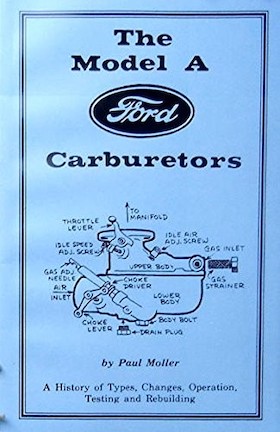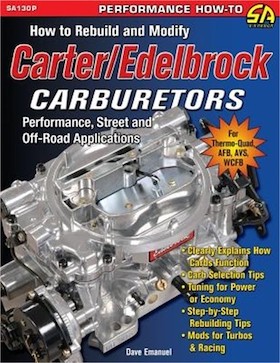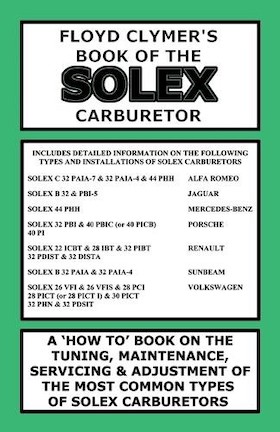
-----
Carburetor re-plating / re-coloring
RFQ: Need instructions and chemicals for recoloring antique automobile carburetors. I have been told that the EPA has made this process too expensive for most small rebuilders. I made an inquiry to EPA and was told that they were not concerned with a private party doing a few dozen carburetors for their own cars. If you can help I will be happy. If you are a chemical supply co., even better.
Duval Lee Kuglerhobbyist auto restoration - Visalia, California, USA
2004
Ed. note: This RFQ is outdated, but technical replies are welcome, and readers are encouraged to post their own RFQs. But no public commercial suggestions please ( huh? why?).
Antique carburetors & parts on
eBay (affil link)
Carburetor Body Finish Improvement
Q. We are in the business of manufacturing two wheeler carburetors in India. Presently we are working towards improving finish of our carburetor bodies (Zinc pressure Die cast) by way of passivation.
What should be the best pre-passivation, passivation and post passivation process to bring a silky smooth finish with a slight glow on our component. It should be able to pass 48-72 hrs salt spray test.
auto components - Faridabad, Haryana, India
2001
A. Dear Mr Wadhwa:
Zinc diecast carburetors can be passivated directly as possibly you are doing and their finish is to a point acceptable.
A second possibility is to plate the carburetor body with Alkaline Cyanide free zinc which is the preferred solution on account of its very high throwing and covering power . it covers the deepest recesses and passivates very well to provide a uniform Blue bright or a white finish that will last for anything from 48 to 96 hours salt spray.
I am reasonably sure platers in FBD who are aware of Alkaline cyanide free zinc will be able to give you the right answer. QC and Plating at Yamaha Faridabad too have plenty of inputs on the subject.
Regards,

Asif Nurie [deceased] [deceased]
- New Delhi, India
With deep sadness we acknowledge the passing of Asif on Jan 24, 2016
Q. I would like to know the chemical process for recoloring carburetors to the original yellow dichromate finish. I am restoring an older Cadillac at the moment.
Thanks,
Industrialist - Seattle, Washington, USA
2005
A. After you have disassembled the carb and solvent cleaned same, find a plater who is willing to chemically clean and re-chromate the part. There is no other way to do it that will be satisfactory.
(Besides being in the metal finishing industry, I too restore cars)
- Great Neck, New York
Q. Good to have you here, Gene. You are the guy who I'd like to ask a related question of! Some have claimed that it is not possible to get a decent look from simply re-chromating a carburetor but, instead, it is necessary to zinc plate old carburetors and chromate the plating. From your experience is this true, untrue, often true, or what? Thanks.

Ted Mooney, P.E.
Striving to live Aloha
finishing.com - Pine Beach, New Jersey
Ted is available for instant help
or longer-term assistance.
A. I know you will hate this Ted but the answer is yes and no.
Depending upon the condition of the casting, the quality of the metal, etc., the results will vary. If the alloy of the casting is low in impurities a consistent, even look from the chromate is probable. The reason for plating first is to get a more uniform finish removing the possibility of unevenness in the appearance of the chromate film which occurred due to casting variations.
- Great Neck, New York
Black stain from poor attempt to clean antique motorycle carburetors
Q. While trying to clean the carburetors of a vintage motorcycle, I've followed a suggestion on a web site and I've boiled them for three hours in an aluminum pot in a solution of water and vinegar
⇦in bulk on
eBay
or
Amazon [affil link] .
The carburetors have now a black stain that I can't clean and handling them makes my fingers black. Due to the intricate structure I can't just polish them.
hobbyist - Waltham, Massachusetts
2007
A. If it was our site that offered the advice, Giovanni, oops, sorry :-)
But I don't think it was, so please tell us where you found that advice so we can investigate.
I believe that what you have done is dissolved a very thin amount of the zinc and/or aluminum into the vinegar, leaving behind the carbon, copper, silicon, or other alloying material that manifests itself as this black smut. A plating shop would use a "desmut" process to remove this, which might be nitric acid, chromic acid, or nitric-hydrofluoric acid depending on the alloy and what they saw.
These desmutting chemicals are not usually considered safe for hobbyists so you might have trouble getting them. If you can afford it, have a plating shop quickly clean these up for you.

Ted Mooney, P.E.
Striving to live Aloha
finishing.com - Pine Beach, New Jersey
Ted is available for instant help
or longer-term assistance.
Q. Thanks Ted,
I forgot to say that before the vinegar, I've boiled the carbs in water and automatic dishwasher detergent, the vinegar was meant as a remedy (and it actually cleaned the aluminum pot pretty well, but it did nothing to the carburetors).
Here is a site that suggests a similar method for airplane model engines:
www.airfieldmodels.com/information_source/model_aircraft_engines/maintenance.htm
Can you suggest any shop in CA? Until Sep. I will be in Southern OC. Otherwise, is there anything that I can do at home?
Thanks again and compliments for the site!
- Waltham, Massachusetts
A. Thank you for the kind words, Giovanni.
If you cannot mechanically remove the smut, but must do it chemically, I think that you will need to use nitric, hydrofluoric (or fluoboric), or chromic acids. Whether you can do this at home is more a matter of personal opinion than fact. My opinion is that untrained people should not use any of these terribly powerful and toxic acids. Further, it is hard to know which one or which combination will be most effective on your smut.
If you can find, in your hardware store or truck stop, an "aluminum brightener" that contains hydrofluoric acid or fluoboric acid there is a chance that it will do at least a little good. It is still a very dangerous chemical but is probably in a more dilute form that is at least marginally safer to use. Good luck.

Ted Mooney, P.E.
Striving to live Aloha
finishing.com - Pine Beach, New Jersey
Ted is available for instant help
or longer-term assistance.
A. It would be a good idea to first confirm that these parts are in fact made of aluminium.
Carburetors are commonly zinc based die castings and your mention of '..intricate structure' suggests that these may be.
I would not dunk them in any more chemicals until you are sure.

Geoff Smith
Hampshire, England
Need a kit to replate auto carburetors the cheapest way
I want to know what is the cheapest way to replate (dichromate metal) carburetor parts (metal) instead of painting them with spray bombs Is there a kit I can purchase
Danny AldridgeCarburetor Rebulder - Wilmington, North Carolina, USA
September 26, 2009
Q. I am restoring a 1930 Model A Ford and would like to restore the Tillotson XF carburetor to its original appearance. I believe it is made of zinc, and the finish has more of a gold-ish dye (almost transparent) look than a painted look.
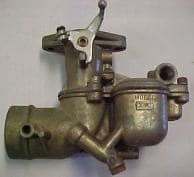
What kind of finish is that called, and where would I go for help to restore it? thanks!
hobbyist - Roseville, California, USA
September 19, 2011
Ed. note: Please see Gene's next reply
Q. I restore 30's era Fords, and want a method of anodizing the pot metal carbs back to original, off gold color, almost an olive drab, what do you recommend?
Bob Dicksonauto restorer - N. Chelmsford, Massachusetts
March 6, 2008
A. They weren't anodized, rather they were chromate filmed.

Jeffrey Holmes, CEF
Spartanburg, South Carolina
A. 1. Anodizing is primarily for aluminum. Carb bodies are zinc die cast.
2. That vintage die cast is "pot metal", an indeterminate zinc alloy
3. The part was probably originally chromated with a hexavalent chrome based solution.
4. Contact a plater who does restoration work to see if they can do this.
5. There are still some platers doing cad, especially in the auto restoration area. If you want zinc a clear/silver chromate would be closest (do not say just clear - you may probably get blue/clear)
- Great Neck, New York
|
|
Q. Gene, - Greenville Ohio February 3, 2024 A. Hi Wes. |
Aluminum smut corrosion
Q. I have applied chromate to (2) carter AFB carburetors: The process was as follows:
1.Cleaned the carburetors with spray carburetor cleaner
⇦ on
eBay
or
Amazon [affil link]
followed by stainless steel wire wheel cleaning/buffing to a gloss finish.
2.The carburetor housings were dipped in PPG DX533 [ed. note: phosphoric acid based cleaner, brightener and pre-paint conditioner for aluminum] (1 to 3 mixed with distilled water) for 2 minutes. When the pieces were removed they were dark gray. The dark surface could be wiped off to some degree when wet.
3.The parts were then rinsed in distilled water and air blown dry with clean shop air.
4.The parts were again wire wheel cleaned using the same process as prior to the DX533 dip. The surface after this step was noticeably brighter than before the dip and looked like new aluminum.
5.The parts were sprayed with carburetor cleaner and air blown dry with clean shop air.
6.The parts were then dipped in PPG DX501 [ed. update Feb 2024: this is a hexavalent chromium chemical, and probably not available anymore] (clear chromate) (1 to 1 mix with distilled water) for 1 minute.
7.The parts were then rinsed in distilled water (separate tank than the DX533 cleaner rinse).
8.The parts were blown dry with shop air.
The parts have slight to moderate yellow color variations but look good and have a moderate shine to them.
My questions are as follows:
1.There are some ports in the carburetor parts that could not be wire wheel cleaned prior to the DX501 dip. Most likely the "smut" is still on the surface of these ports. If so, can this pose a long term corrosion problem?
2.Should I have de-smutted the parts in a nitric acid bath or comparable de-smutting solution prior to final wire wheel cleaning/buffing and the DX501 dip?
3.If I de-smutted the parts would the surface finish end up being dull, i.e., matte or would it maintain the luster similar to when they were wire wheeled?
Engineer (P.E.) - Amherst, Virginia
August 20, 2013
 I am working on carbs for a 1981 Yamaha xv 750. I dipped one in a solution of muriatic acid. This was supposed to just clean the gummy stuff off but it took all the plating off and left the smutty crud. Did you ever find out how to remove it from the small passages inside?
I am working on carbs for a 1981 Yamaha xv 750. I dipped one in a solution of muriatic acid. This was supposed to just clean the gummy stuff off but it took all the plating off and left the smutty crud. Did you ever find out how to remove it from the small passages inside?
- Columbia falls Montana
January 30, 2023
Q. Hey guys, on a related note I'm looking into restoring an old Solex carb I picked up at the junk yard. I'm doing this so I can learn more about the carb, but mainly to start getting good at restoring the finish.
Here's a picture of the carb:
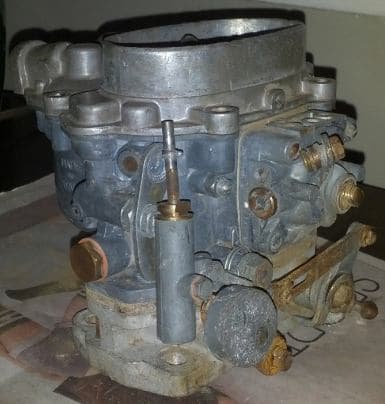
Basically, I'm wondering about how you can tell what the different compositions of each part are? I'm seeing a lot of references to zinc and chromate and polishing and such but I can't tell if this carb is made of any of those.
Thanks!
- Atlanta, Georgia
September 24, 2013
A. That carb looks like old Mercedes. I have seen small quantities of blue chromate advertised on the net for restoring zinc castings, also gold. First the metal prep. It needs to be glass beaded low pressure with AC grade. Then a mild nitric bath. Then into the chromate 5-10 seconds. Then into clean warm water rinse. Air dry.
Donald Dorfman
- Edgewood, Washington, USA
July 31, 2018
Carburetor cleaning and refinishing has been a perennial subject. Please see also --
• Topic 0338 "Zinc plating & chromating of Carburetors"
• Topic 11847 "Restoring gold Iridite color to diecast parts"
• Topic 16200 "Zinc plate carburetors & diecastings vs. chromating"
• Topic 33779 "Clean and brighten carburetor bodies"
• Topic 37255 "Restoring the yellow dichromate finish on automobile carburetors"
Q, A, or Comment on THIS thread -or- Start a NEW Thread
